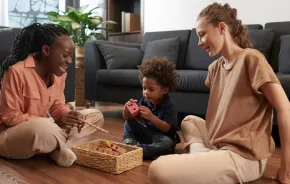
Not all children make a successful transition into school. According to Megan McClelland, a child development expert at Oregon State University, up to 25 percent of children experience difficulties when they start school. Being ready for school is not just about your child acquiring academic skills such as having a certain number of words in their vocabulary by the time they enter school, being able to identify certain written words or knowing how to count to a given number. School readiness also refers to the development of certain social and emotional traits that determine whether or not kids will successfully transition into school.
In one study of 276 at-risk children ages 3–5, McClelland and other OSU researchers sought to determine whether specific interventions would help improve school readiness. While children in some groups participated in movement- and music-based activities, those in the control group did not receive any intervention. The researchers found that the children who had received intervention had higher scores for self-regulation than those who had not participated in the activities.
We now know that the best results are obtained when schools and families work together to ensure that children are ready to engage in and benefit from learning experiences. The good news is that relatively simple techniques can be applied at home to support your child’s school readiness. Children can learn self-regulation skills through games and activities that are inexpensive and easy to teach at home.
Here are five things you can begin doing today to strengthen your child’s school readiness:
Play games that strengthen your child’s self-regulation skills.
In the study mentioned above, the researchers found that games that encourage children to pay attention and follow specific instructions are critical to their success in their early years and beyond. Researchers proposed a different version of the “red light, green light” game and changed the rules to encourage the children to pay attention. For example, color cues were used to tell the children what was expected of them (“orange means go”), and then the cues were later changed (“orange means stop”).
In a different study, the same researchers found that introducing variations to the “Head, Shoulders, Knees and Toes” song could help teach kids to listen and pay attention. They found that asking children to do the opposite of what they were told (for example touch their toes when they are asked to touch their head) helped develop their focus and concentration.
Work on reinforcing your child’s concentration.
It is not uncommon for young children to struggle with processing information. The more instructions you give them, the harder it will be for them to follow through. Giving your child only a few instructions at a time can make it easier for them to understand and remain focused on what they are expected to do. If your child is struggling with completing instructions, asking them to repeat what they are expected to do can make it easier for them to follow through.
Specific games such as puzzles and mazes can also help improve your child’s concentration, but you must choose games that are developmentally appropriate. Rather than focusing on your child’s chronological age, focus on what they are actually capable of doing.
Foster your child’s emotional intelligence.
Your child’s emotional intelligence is a key factor in determining whether or not they will adapt to the school environment. An emotionally intelligent child knows when to ask for help, but a child who has yet to develop their emotional intelligence skills is more likely to have a meltdown when faced with difficult emotion-provoking situations; they may even adopt inappropriate behavior to camouflage an inability to deal with difficult feelings, such as anxiety.
Helping your child to identify and name their emotions and those of others, talking about your own emotions to show your child that emotions are normal, and helping them to identify appropriate ways of responding to big emotions can reduce emotion-driven behavior and increase their school readiness.
Help your children practice self-control.
In today’s culture of instant gratification, many children struggle with self-control. The good news is that there are simple activities to help teach your child self-control. For example, playing games that require all players to take turns is an easy way to increase self-control skills.
Encouraging your child to make decisions within a parent-controlled framework can also help them practice self-control. Even simple questions such as “Will you take your bath now or after your snack?” or “Do you want to wear the black shoes or the red ones?” teach kids to reflect on different options and make decisions.
Adopt a reading culture.
Reading is one of the easiest ways to help increase your child’s school readiness. It can awaken their curiosity, teach them new words and reinforce communications skills. In other words, reading develops your child’s vocabulary, language and social skills.
When reading to young children, it is important to encourage them to participate by asking questions or making comments about the story or the characters in the book you are reading. For example, you can point to a picture and say something like, “How do you think he feels?” Or you can make connections with something your child already knows: “Look, there’s a lion here — do you remember what other animals we saw at the zoo?” or “Look at the orange butterfly. Do you remember the color of the butterfly we saw at the park yesterday?”
Children’s school readiness has been associated with academic, social, emotional and behavioral benefits in childhood and beyond. The earlier you start preparing your child for school, the better the chances are that your child will meet with success both in school and in life.











